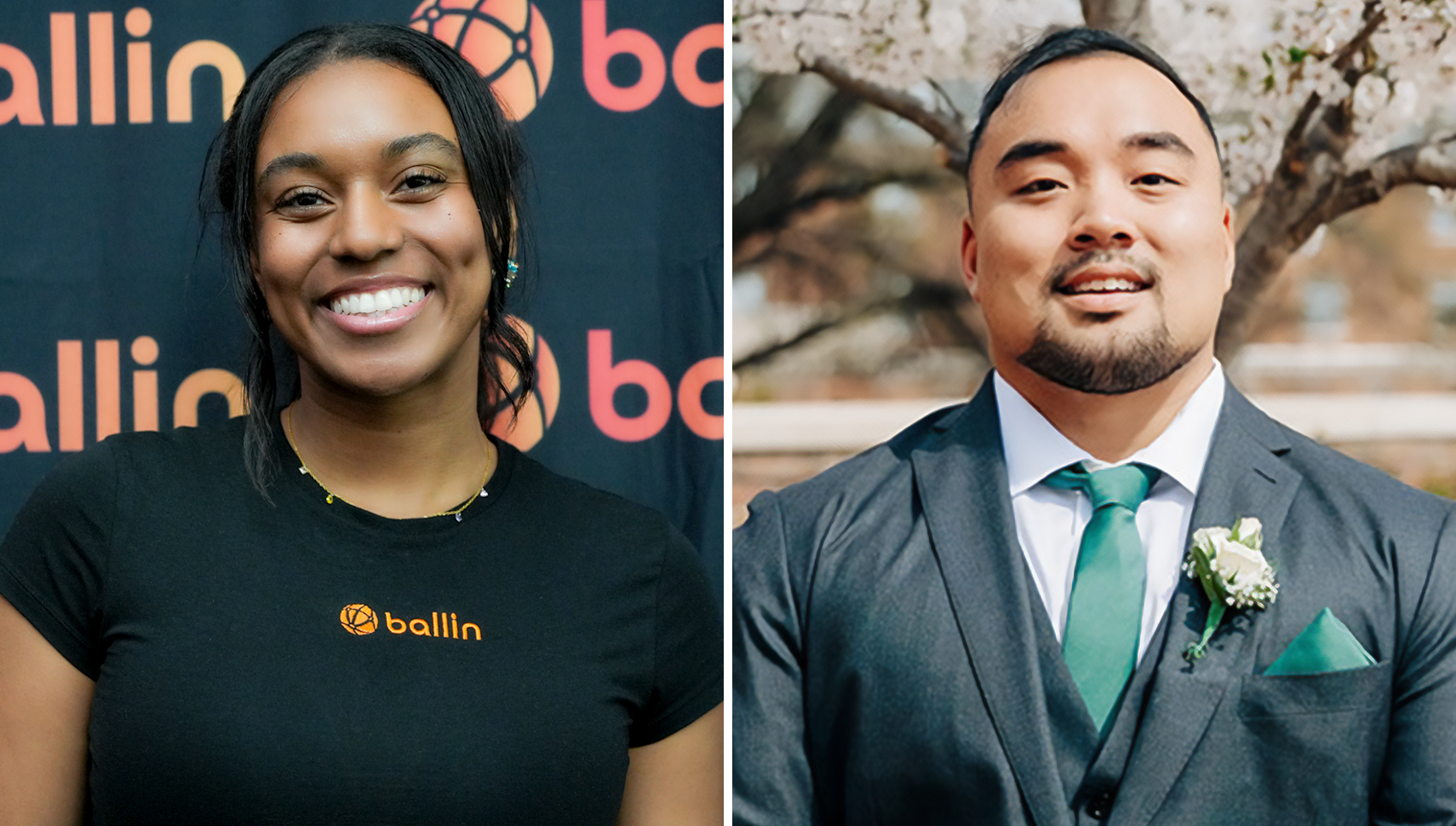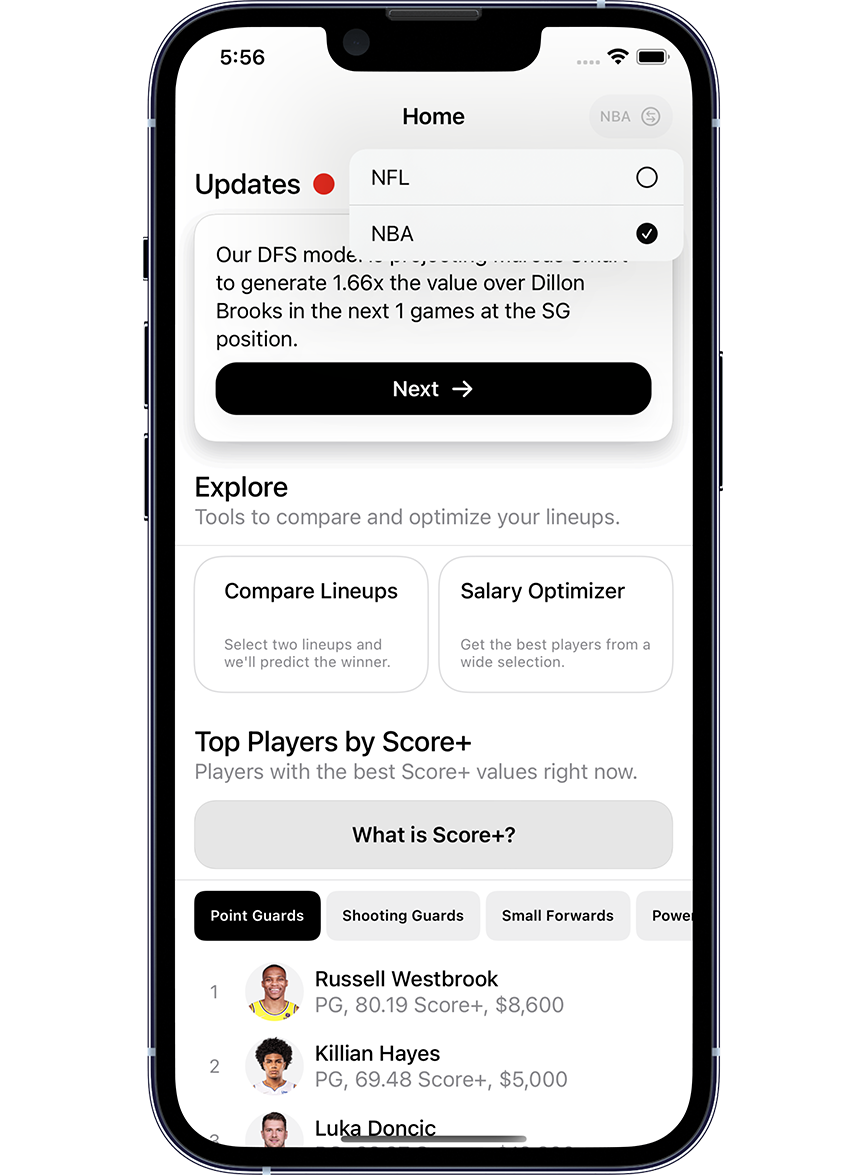AI Is a New Ball Game
Alumni launch apps to connect players with coaches and improve fans’ experience with fantasy sports
October 1, 2025
By
Anna Kormis
Photo By
Capture Photography

Nyla Pollard ’21 and Noah Kim ’19 know what success on the court, field and ice looks like. Now they know what success looks like as entrepreneurs in the digital space. They pursued interests formed at William & Mary to create artificial intelligence-based apps that they hope will shake up the worlds of recruitment and fantasy sports.
GAMIFYING PERFORMANCE & RECRUITMENT
Pollard is the chief executive officer of Ballin AI, an app that analyzes the performance of student-athletes and allows coaches to more efficiently find students who will fit in their college programs. The idea for Ballin AI came to Pollard during her first year at W&M, and she made it reality around five years later. This past July, the passion and excitement she built around the app secured her funding to close the company’s $500K angel round.
As a combo guard on the W&M Women’s Basketball team, she had the skills and attributes of both a shooting guard and point guard — evaluating the game, initiating plays and scoring points in various ways. These skills translate directly into creating and running a successful business, she says. “If there’s something that’s needed of you in sports and in entrepreneurship and you don’t have that skill or capability, you must go develop it, because that’s what your team needs,” Pollard says.
At W&M, Pollard was an education and sociology double major. “Being able to impact a child’s life in a positive way, I think that has ripple effects throughout the rest of their life,” she says. Her love of mentoring and the art of teaching helped guide Ballin AI’s purpose — to provide performance insights to students and allow for more students to be seen by coaches outside of games and travel competitions.
Professional sports teams, leagues and players all over the world will use the app to aid in recruitment and help improve performance. Athletes can upload videos to be evaluated and see how to improve their game. The app creates a personalized development plan based on their evaluation report, allowing athletes to track their growth. This gamification of improvement is closely related to Pollard’s belief that “if it’s not fun, I’m not doing it.”
In addition to improving their skills by using the app, athletes can showcase them to be recruited by coaches. These coaches will be able to find players faster and maximize their roster. They are able to see which position the athlete plays, their level, school, location, year and the score Ballin AI has given them. Pollard wanted “a better way to connect the right high school basketball players with the right college program,” not only helping the players, but helping the coaches see which players would click with the team. In addition to scores, the app provides compatibility insights to help coaches predict which recruits will thrive in their program, since team chemistry is beneficial to its success.
At William & Mary, Pollard started the first student-athlete mentorship program through the Student Athlete Advisory Council. “Student-athletes would come and we would pair them with mentors who could help them in their career,” she says. Now she is a mentor to current students through the Entrepreneurship Hub, and in June, she spoke at Mosaic Weekend to encourage fellow alumni to do the same.
Joining Pollard in leading Ballin AI is another member of the Tribe, Bianca Boggs ’19. Boggs was a shooting guard on the court with Pollard and is now the chief operating officer. Ballin AI’s first hire, Danielle McTeer ’24, started as an intern and is now the project manager.
DATA SCIENCE MEETS GAME DAY
While Pollard and her team are helping athletes and coaches connect more effectively, Kim is focused on improving the fantasy sports experience for fans.
Kim is the co-founder and chief executive officer of SportAI, “a mobile app integrated with generative AI that democratizes fantasy sports analytics and helps anyone get into fantasy sports,” he says. “We want to make it easy for the user to understand and decipher player data and not be intimidated by playing it.”
As a W&M student, he double majored in data science and anthropology. “I wanted to do data science to gain technological skills. Anthropology helped me understand humanity and societal interaction at a granular level. This way, I not only knew how to build AI, but I also knew how new technologies go hand in hand with social trends, humanities’ trajectory and where exactly my impact would be,” Kim says.
Kim’s early experience with data science and coding was in high school when he showcased his creations in a video game competition and an animatronic competition, bringing home second place in both. His interest in data science led to him being part of the first graduating class of data science majors at William & Mary in 2019.
The experience of being a college athlete — football, ice hockey and weightlifting — at a prestigious school helped him learn how to manage a schedule. “It was like working a full-time job as an 18-year-old kid,” Kim says. “I did block scheduling, where I would block off certain times for athletics, academics, roadmap planning and socialization. I think part of that was why William & Mary is such an amazing institution; it allowed me to customize how I wanted my academic journey to go.”

Kim compares each of the three sports he played at W&M to an aspect of running a startup. “Football is my big-corporation experience. Across the many positions, it’s a massive organization that needs to work together. For hockey, it’s a smaller team, so even with a full roster, there’s less people, just like a startup. I played center — you have to be responsible for all different responsibilities on the ice from faceoffs to defense to scoring,” he says, adding that weightlifting taught him the individual aspects: “For the startup world, or creating your own business, there are going to be a lot of solo battles where you are going to have to continuously improve.”
Using the skills he gained through academics and sports, Kim created SportAI with fellow W&M data science alumnus Charlie Strohl ’20 to help people build their fantasy leagues. The idea for the app came during the COVID-19 pandemic when fans turned to fantasy leagues to stay connected with the sports they love, but they lacked reliable data to make informed decisions. Tapping into data analytics and machine learning, the app will create a metric for each player, allowing the user to adjust their choices into an optimal fantasy lineup.
Kim’s mentality in creating SportAI was that of empathy and curiosity. His faculty mentors are Tomoko Hamada, who taught him about understanding human interaction in business and that data is unbiased; Sasikumar Balasundaram, who taught him to question everything; and Dan Runfola, who showed him the importance of combining humanities with the STEM sciences. Kim pays forward the support he received at William & Mary by speaking with students at the Entrepreneurship Hub.
W&M’s School of Computing, Data Sciences & Physics will prepare students for the growing field of computing sciences. “We need more people who can understand technology, humanity, how they connect, and then communicate how to bridge that gap effectively,” Kim says.
From Ballin AI’s performance and recruitment insights to SportAI’s accessible fantasy league metrics, Pollard and Kim are proving that William & Mary alumni don’t just play the game, they change it. For both, success is no longer measured in just points or goals but in the connections and opportunities their innovations create.